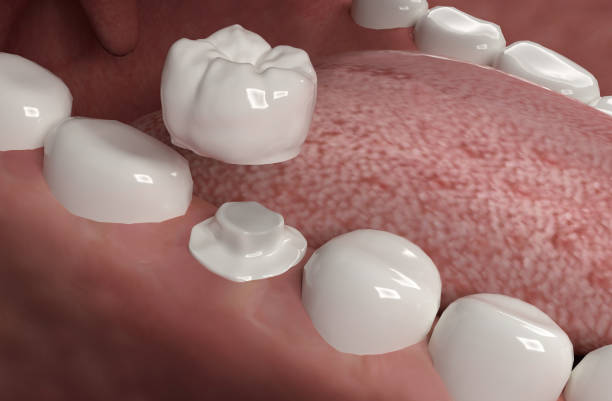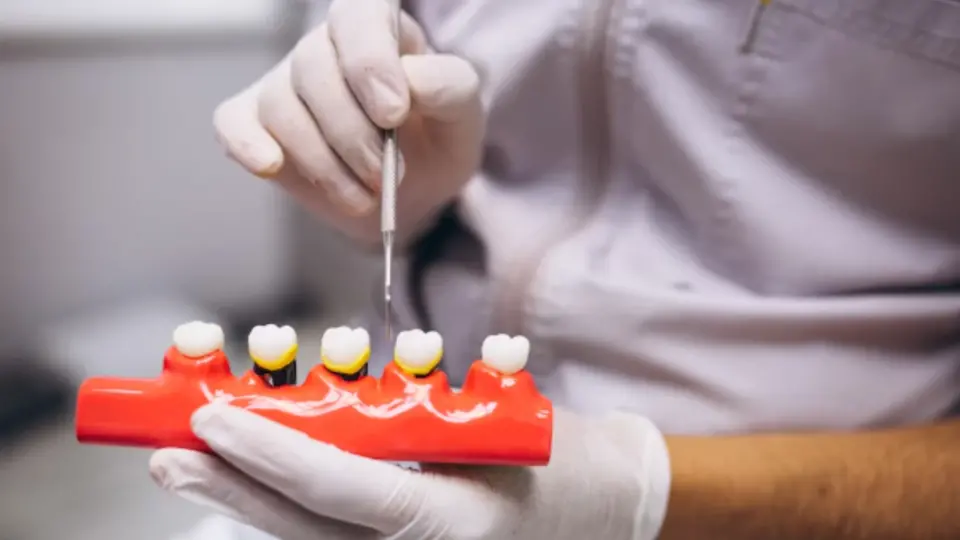How Dental Crowns Can Save Damaged Teeth from Extraction

Dental crowns are a powerful solution for saving teeth that are damaged, decayed, or weakened, offering an alternative to extraction. If you’ve been told that your tooth might need to be pulled, a dental crown could be the key to preserving it.
Crowns act like a protective shield, covering the entire visible part of the tooth, restoring its strength, shape, and appearance. Whether your tooth has been cracked, chipped, or undergone a root canal, a crown can provide the durability needed to keep it functional for years to come. This not only helps maintain your natural smile but also prevents the need for more complex and costly dental procedures.
By opting for a crown, you’re choosing a solution that supports long-term oral health, allowing you to bite, chew, and smile with confidence. Let’s explore how dental crowns can save your teeth and improve your overall dental well-being.
What are the benefits of dental crowns for damaged teeth?
Dental crowns offer several benefits for damaged teeth, providing a comprehensive solution to restore and protect oral health:
- Restoration of Strength: Crowns reinforce weakened or damaged teeth, allowing them to withstand normal biting and chewing forces, which helps prevent further damage or fractures.
- Preservation of Natural Teeth: Crowns help preserve the natural tooth structure by covering and protecting a damaged tooth, reducing the need for extraction, and maintaining the alignment of surrounding teeth.
- Enhanced Functionality: Crowns restore the full functionality of damaged teeth, improving the ability to chew and speak effectively, which is crucial for overall oral health and daily comfort.
- Aesthetic Improvement: Crowns can be customized to match the color, shape, and size of natural teeth, enhancing the appearance of damaged teeth and providing a seamless, natural look.
- Prevention of Decay: Crowns protect the underlying tooth from further decay and damage, particularly if the tooth has undergone extensive treatment or has large fillings.
- Support for Large Fillings: Crowns offer additional support for teeth with extensive fillings or structural damage, helping to prevent the tooth from breaking or deteriorating further.
- Reduced Risk of Complications: By addressing issues such as significant decay or fractures with a crown, patients can avoid more invasive treatments, such as root canals or extractions, which may be necessary if the damage worsens.
Dental crowns provide a durable and effective solution for restoring damaged teeth. They ensure both functional and aesthetic benefits while preserving natural oral health.
How do dental crowns protect teeth from further damage?
Dental crowns protect teeth from further damage through several key mechanisms:
- Reinforcement: Crowns act as a protective cover for damaged or weakened teeth, effectively reinforcing their structure. This additional material layer helps the tooth withstand chewing and biting pressure, reducing the risk of fractures or breakage.
- Protection of Vulnerable Areas: Crowns shield areas of the tooth that are particularly vulnerable, such as large cavities, cracks, or worn-down surfaces. By covering these areas, crowns prevent further decay or deterioration that could lead to more severe issues.
- Prevention of Further Decay: A well-fitted crown seals the tooth, preventing bacteria and food particles from entering and causing additional decay. This protective barrier helps maintain the integrity of the underlying tooth structure and prevents further damage.
- Stabilization of Tooth Structure: Crowns provide stability and support for teeth with extensive fillings or structural damage. This stabilization helps prevent the tooth from cracking or splitting under the stress of normal use.
- Reduction of Sensitivity: Crowns can cover exposed dentin or sensitive areas, reducing discomfort and sensitivity caused by temperature changes, pressure, or certain foods. This helps prevent further damage that these factors could trigger.
- Preservation of Natural Tooth: Covering and protecting a damaged tooth, crowns help preserve the natural tooth structure. This approach avoids more invasive procedures, such as extractions or root canals, which might be necessary if the damage progresses.
Dental crowns play a crucial role in safeguarding teeth from further harm by providing a durable protective cover that enhances their function and longevity.
Can dental crowns prevent the need for tooth extraction?
Yes, dental crowns can often prevent the need for tooth extraction. Here’s how:
- Restoring Strength: Crowns reinforce weakened or damaged teeth, allowing them to continue functioning effectively. By restoring strength, crowns help avoid the progression of damage that could otherwise lead to extraction.
- Protecting Damaged Teeth: Crowns cover and protect teeth with large fillings, extensive decay, or fractures. This protective layer helps prevent further deterioration, which might otherwise necessitate extraction if left untreated.
- Preventing Further Decay: A well-fitted crown creates a seal that protects the underlying tooth from bacterial infection and decay. By preventing additional decay, crowns reduce the likelihood of severe damage that could require extraction.
- Supporting Tooth Structure: Crowns provide support and stabilization for teeth with significant structural damage. This support helps prevent the tooth from breaking or splitting further, which could lead to extraction.
- Avoiding More Invasive Procedures: Crowns can address issues that might otherwise require more invasive treatments, such as root canals or extractions. By treating the tooth conservatively with a crown, the need for extraction can often be avoided.
- Maintaining Tooth Function: Crowns restore the tooth’s ability to chew and perform its natural functions, preserving its role in the mouth and reducing the risk of complications that could lead to extraction.
By providing a protective and reinforcing solution, dental crowns help maintain the health and functionality of damaged teeth, often preventing extraction and allowing patients to keep their natural teeth.
What is the process of getting a dental crown for a damaged tooth?
The process of getting a dental crown for a damaged tooth typically involves several steps:
- Initial Consultation: Starting with a dental exam, where the dentist evaluates the condition of the damaged tooth and discusses treatment options. X-rays may be taken to assess the tooth’s health and structure.
- Tooth Preparation: The dentist removes decay and prepares the injured tooth weakened portions. If the tooth has a large filling or significant damage, the dentist reshapes it to ensure a proper fit for the crown.
- Impressions: After preparing the tooth, the dentist takes impressions of the tooth and surrounding teeth. Custom crowns made from these imprints fit precisely. Modern practices may use digital impressions for more accuracy.
- Temporary Crown: The dentist sets a temporary crown on the prepared tooth while a permanent crown is constructed. Tooth is protected with a temporary crown function and appearance.
- Crown Fabrication: The impressions or digital scans of permanent crowns are made in a dental lab. This process usually takes a few weeks, during which the laboratory creates a custom crown that matches the natural tooth’s color, shape, and size.
- Crown Fitting: Once permanent the dentist replaces the temporary crown with the permanent one. The dentist checks the fit, bite, and appearance and makes any necessary adjustments to ensure a comfortable and natural result.
- Final Cementation: After confirming the proper fit and alignment, the dentist permanently cements the crown onto the prepared tooth. The excess cement is cleaned away, and the crown is polished.
- Post-Treatment Care: The dentist provides instructions for the care and maintenance of the crown, including oral hygiene practices and any dietary considerations. Regular check-ups are scheduled to monitor the crown and overall dental health.
This process ensures that the dental crown effectively restores the damaged tooth, providing durability, functionality, and a natural appearance.
Save Your Tooth: Discover Crown Benefits Today!
At Illume Dental of McKinney, we specialize in saving damaged teeth with custom dental crowns. If you’re facing extensive decay, fractures, or wear, our crowns offer a durable solution that can restore strength and functionality to your teeth.
By covering and protecting your damaged tooth, crowns help prevent the need for extraction and maintain your natural smile. Our skilled team will guide you through every step, ensuring a comfortable and effective treatment.
Don’t let dental issues lead to extraction—schedule your appointment today and discover how crowns can preserve your teeth and enhance oral health!


